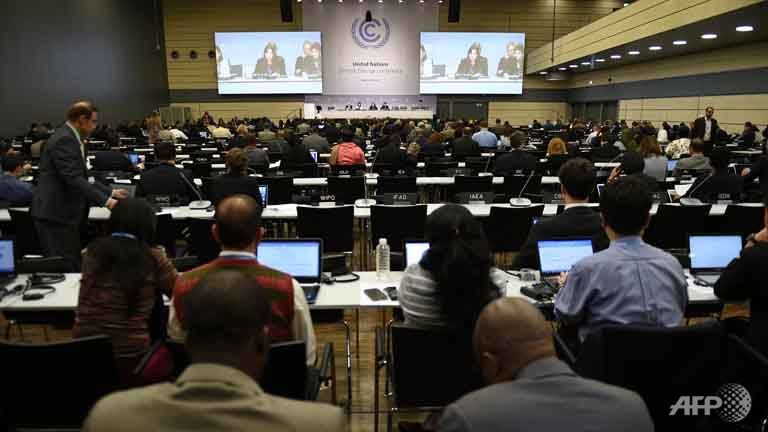France seeks 'strong progress' at preparatory climate talks
 |
| Delegates attend the United Nations Framework Convention on Climate Change (UNFCCC) in Bonn, Germany, June 1, 2015. (Photo: AFP/Patrik Stollarz) |
PARIS: Foreign minister Laurent Fabius of France, host of a crucial year-end United Nations (UN) climate conference, urged negotiators on Friday (Oct 17) to make "strong progress" at home-stretch talks in Bonn next week for a climate rescue pact.
A slimmed-down blueprint for what would be the first-ever global climate agreement is expected to be hotly debated at the five-day session, which opens in the former west German capital on Monday. It will be the final official negotiating round before the November 30-December 11 Paris conference.
"We have to hope that parties accept it (the latest version of the draft) as the basis for negotiation," Fabius told journalists in Paris. "There will certainly be additions and changes and that is normal, but my wish is that parties will make the best use of these few days to make strong progress."
Negotiators will tackle a long list of deeply divisive issues, starting with how to divvy up responsibility for limiting, and adapting to, fossil fuel-driven threats to the Earth's climate system. There is also the question of who should foot the bill.
The Bonn session must yield an "advanced draft" to be polished by government ministers and heads of state for adoption in Paris.
Since the last meeting in September, the joint chairmen of the talks, Algeria's Ahmed Djoghlaf and Daniel Reifsnyder of the United States, have slashed the blueprint from 80-odd pages to 20.
"Now we have to choose between the many options," Fabius said. "A maximum number of issues must be settled even before the beginning of the (Paris) conference."
"We have to avoid the Copenhagen syndrome," he added, referring to the 2009 UN conference in the Danish capital that ended with more than 110 frustrated heads of state and government struggling, in vain, to forge a comprehensive deal.
For Paris, world leaders have been invited to attend on the first day only, to give "political impetus" to ministers and officials who must deliver the final product.
After Copenhagen, nations set a new deadline of 2015 for an agreement that would enter into force in 2020. The overarching goal is to limit average global warming to two degrees Celsius (3.6 degrees Fahrenheit) over pre-Industrial Revolution levels to avoid worst-case-scenario changes to Earth's climate system.
What the stars mean:
★ Poor ★ ★ Promising ★★★ Good ★★★★ Very good ★★★★★ Exceptional
Latest News
More News
- Russian President congratulates Vietnamese Party leader during phone talks (January 25, 2026 | 09:58)
- Worldwide congratulations underscore confidence in Vietnam’s 14th Party Congress (January 23, 2026 | 09:02)
- Political parties, organisations, int’l friends send congratulations to 14th National Party Congress (January 22, 2026 | 09:33)
- 14th National Party Congress: Japanese media highlight Vietnam’s growth targets (January 21, 2026 | 09:46)
- 14th National Party Congress: Driving force for Vietnam to continue renewal, innovation, breakthroughs (January 21, 2026 | 09:42)
- Vietnam remains spiritual support for progressive forces: Colombian party leader (January 21, 2026 | 08:00)
- Int'l media provides large coverage of 14th National Party Congress's first working day (January 20, 2026 | 09:09)
- Vietnamese firms win top honours at ASEAN Digital Awards (January 16, 2026 | 16:45)
- ASEAN Digital Ministers' Meeting opens in Hanoi (January 15, 2026 | 15:33)
- ASEAN economies move up the global chip value chain (December 09, 2025 | 13:32)
















 Mobile Version
Mobile Version